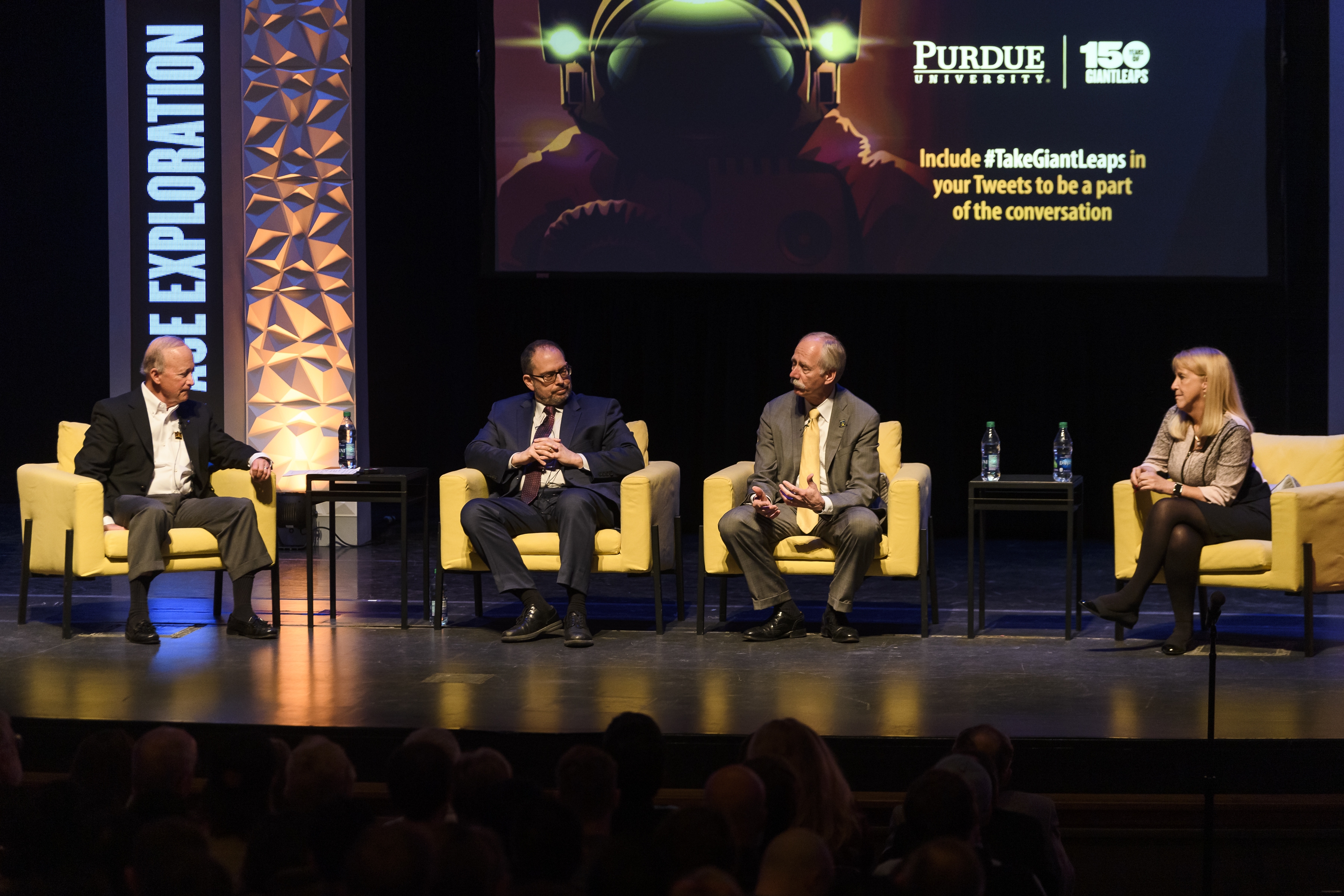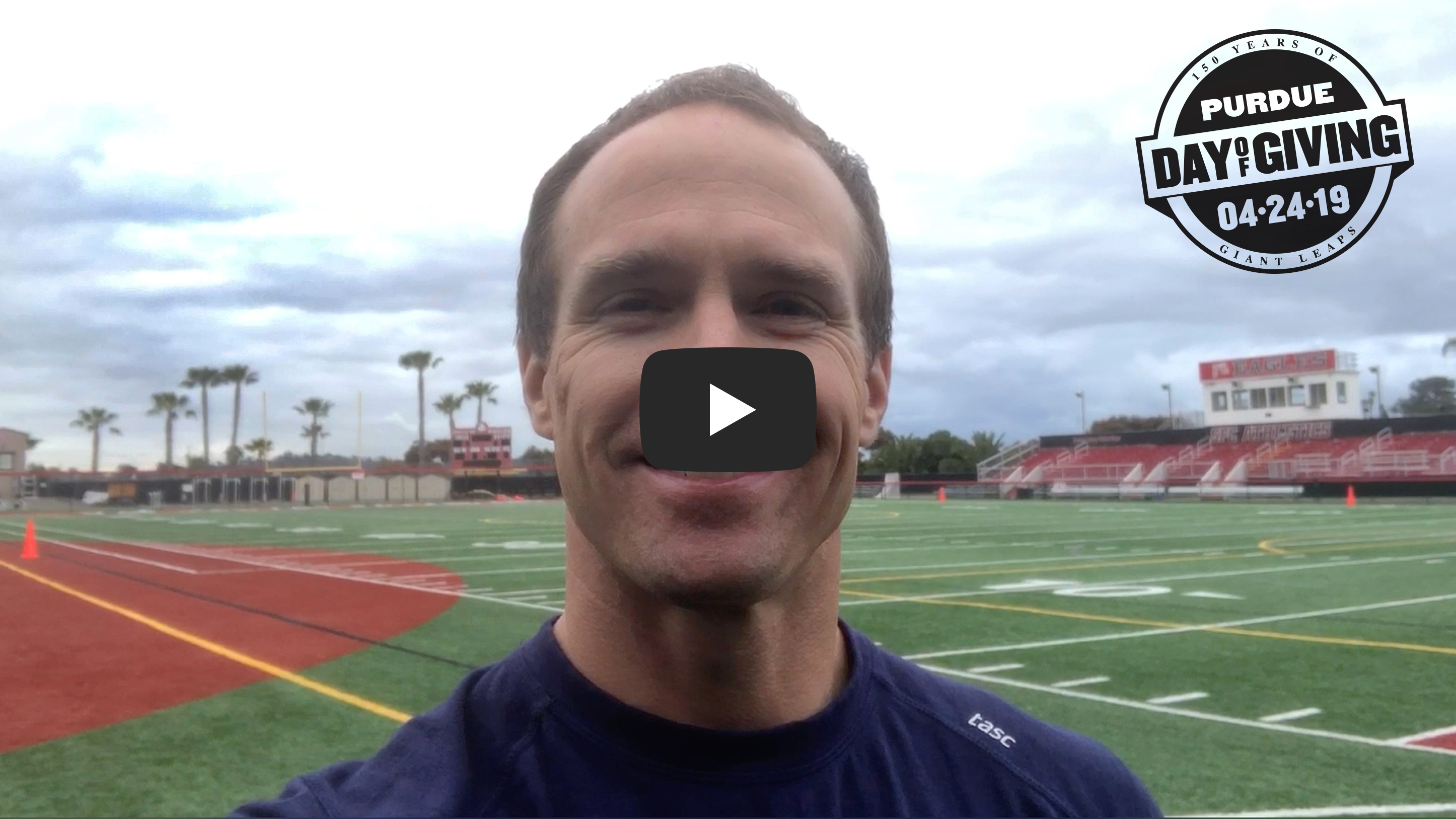A Message From President Daniels
April 2019
Dear Alumni and Friends,
I’d like to start this month’s letter by thanking the entire Purdue family for everything you do for your university all year long, but especially last week during the Purdue Day of Giving.
You have helped us set yet another record, contributing more than $41 million in just 24 hours to help support nearly 300 causes and organizations at Purdue. On one day, 21,420 Boilermakers came together from all 50 states and 60 countries around the world, including as far away as Albania, China and Uruguay.
Once again, Bands & Orchestras had the highest participation rate of any unit on campus, receiving generous contributions from more than 2,700 gifts. The newest member of the Purdue family, Purdue University Global, participated in Day of Giving for the first time this year and is grateful to have received gifts from 441 individuals around the globe in support of their mission to open the gates of higher education even wider.
I long ago stopped being surprised by the generosity of the Boilermaker community, but through the overwhelming success of Day of Giving, now the entire nation knows.
150th anniversary celebration continues
The busy end-of-semester season hasn’t slowed down our enthusiasm for celebrating Purdue’s 150th anniversary. I had a great discussion with world-renowned author and political theorist Francis Fukuyama on identity politics and the future of democracy in an event sponsored by the College of Liberal Arts and the Department of History in mid-April.
The very next night, we were delighted to welcome Apple co-founder and personal computer pioneer Steve Wozniak, who answered questions from a packed crowd in Elliott Hall on all things Apple, artificial intelligence and the future of technology.
Our celebration continues throughout the summer months, kicking off with the highly anticipated arrival of the next great book from noted Boilermaker and author John Norberg, providing fascinating insights on the people and research discoveries that have shaped Purdue’s history.
When released next Monday, May 6 — Purdue’s official 150th anniversary, the day Gov. Conrad Baker signed a bill creating the University — “Ever True: 150 years of Giant Leaps at Purdue University” will be available from the Purdue University Press.
You also won’t want to miss “Purdue at 150: A Visual History of Student Life,” featuring nearly 700 photos that tell Purdue’s story through decades of student papers, scrapbooks, yearbooks, letters, newspapers, historical photographs and memorabilia preserved in the Purdue University Libraries Virginia Kelly Karnes Archives and Special Collections Research Center. This stunning coffee table book will also be released on May 6 from the Purdue University Press.
Both books are available for preorder from the Purdue University Press here.

If you’re on campus this summer, I encourage you to visit the Purdue Archives and Special Collections to view the "Apollo in the Archives” exhibition, which includes a selection of papers from our Neil Armstrong archive commemorating the upcoming 50th anniversary of his historic first steps on the moon on July 20, 1969. Through May 11, the Ringel Gallery in Stewart Center is also hosting a special “Return to Entry” exhibition honoring Armstrong’s giant leap for mankind.
Cradle of Astronauts, and more
In the midst of our celebration, Purdue’s tradition of close involvement with all things “space” grows stronger. Alumna Beth Moses earned her Commercial Astronaut Wings from the Federal Aviation Administration on April 9, further solidifying our status as the Cradle of Astronauts.
Also this month, Purdue was selected by NASA as one of two new Space Technology Research Institutes (STRIs) to advance the design of resilient space habitats. Led by Purdue professor Shirley Dyke and in partnership with three other universities and two industrial partners, the Purdue Resilient ExtraTerrestrial Habitats (RETH) Institute is working to develop safe and sophisticated habitats for humans who might one day live and work on Mars or the moon.

Members of Purdue University’s new Resilient ExtraTerrestrial Habitats Institute are studying the hurdles in building habitats like this on the moon or Mars.
Last week, during an Ideas Festival forum on space policy, Bill Gerstenmaier, NASA associate administrator for Human Exploration and Operations; Mary Lynne Dittmar, executive director of the Coalition for Deep Space Exploration; and Jonathan Lunine, planetary scientist, joined me for a panel discussion on what it would take for the U.S. to return to the moon and send humans to Mars and beyond. You can watch a recording of the full conversation here.
The event also included two important announcements: First, that Purdue will proudly award Bill Gerstenmaier, who received a bachelor of science in aeronautical engineering from Purdue in 1977, an honorary doctorate during next week’s Commencement festivities.
And second, that an extremely rare Martian meteorite that once resided in a drawer in Purdue’s Biology Department, but has been on display at the Field Museum of Natural History in Chicago for decades, has officially returned to Purdue. You can see the Lafayette Meteorite for yourself and read its formative story in the Neil Armstrong Hall of Engineering on display next to the moon rock brought back by the Apollo 17 astronauts through the end of our 150th anniversary celebration this fall.

President Daniels speaks with Jonathan Lunine, Bill Gerstenmaier and Mary Lynne Dittmar during an Ideas Festival event on space policy.
Faculty compensation at Purdue
I've heard from a number of alumni who read about a new American Association of University Professors (AAUP) study of faculty compensation and want to know: What about Purdue?
Provost Jay Akridge looked closely at the data and reported the findings to the University Senate earlier this month.
At Purdue, salaries have grown 13% (or, 6% above inflation) over the past five years, substantially more than the average. The AAUP findings also show the competitiveness of Purdue’s compensation, which exceeds that of our peers at each level of faculty rank when adjusting for geographical differences in cost-of-living expenses.
May is Motorsports Month
On the heels of the 62nd Purdue Grand Prix in early April — won by Brenden Johnson, a senior from Purdue’s College of Engineering and Technology at IUPUI — May is shaping up to be “Motorsports Month” in Indianapolis, and I don’t just mean the Indy500.
High school and college students from all over the world will join Purdue Motorsports in Indianapolis to compete in the EV Grand Prix at the Indianapolis Motor Speedway on May 14-15.
Now in its 10th year, this STEM competition has grown to include teams that not only design, build, test and drive their own electric karts, but also who will design and pilot autonomous electric karts. With autonomous karts taking the track, the competition is the first collegiate autonomous race of its kind.
Honoring a Boilermaker legend
The State of Indiana will pay its respects to one of Purdue’s greatest alumni, Sen. Birch Bayh, on Wednesday. I’ve been invited to speak, which I’ll do on behalf of Boilermakers everywhere.
Senator Bayh graduated from Purdue in 1951 with a degree in agriculture, but soon found a different calling in public service. While at Purdue, he observed that there were few opportunities for women to participate in athletics and that there were just two women in his agriculture classes. As a U.S. senator, he championed the Title IX amendment to the Education Act in 1972, which grants men and women equal access to all educational programs and activities at public educational institutions like Purdue. (A sign of the times, and of the success of Title IX: Today’s College of Agriculture is 57% female.) He is also the only member of Congress since the founding fathers to have authored two constitutional amendments, the 25th and 26th.
Purdue remains one of the few large universities still naming each graduate individually at its commencements. These days it takes six ceremonies to do so, but I hope we never abandon the practice.
It’s a special privilege to celebrate the achievements of our hard-working graduates at commencement each spring. If you have a student among them, congratulations!
Boiler Up!
Mitchell E. Daniels, Jr.
President

